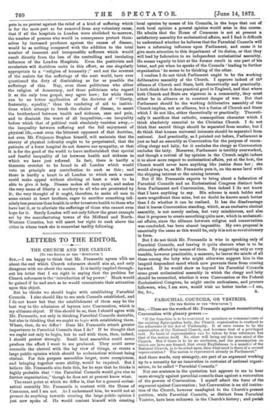LETTERS TO THE EDITOR.
THE CHURCH AND THE CLERGY.
[TO THE EDITOR OF THE " SPROTATOR.1
SIR,—I am happy to think that Mr. Fremantle agrees with me about the end which Church reformers should aim at, and only disagrees with me about the means. It is tacitly implied through- out his letter that I am right in saying that the problem for Church reformers is the 'introduction of lay power.' Much would be gained if he and such as he would concentrate their atttention upon this object.
But he thinks we should begin with establishing Parochial Councils. I also should like to see such Councils established, and I do not know but that the establishment of them may be the best way to the admission of laymen into Convocation, which is my ultimate object. If this should be so, then I should agree with Mr. Fremantle, not only in thinking Parochial Councils desirable, but also in thinking that we ought to begim with establishing them. Where, then, do we differ? Does Mr. Fremantle attach greater importance to Parochial Councils than I do? If he thought that we ought not only to begin, but to end with them, then. indeed, I should protest strongly. Small local assemblies could never produce the effect I want to see produced. They could never reconcile the clerical with the lay view of things, or create a large public opinion which should be ecclesiastical without being clerical. For this purpose assemblies larger, more conspicuous, and bringing together more ability, would be required. But I believe Mr. Fremantle also feels this, for he says that he thinks it highly probable that "the Parochial Councils would give rise to further organisation," though he does not at present know what.
The exact point at which we differ is, that for a general ecclesi- astical assembly Mr. Fremantle is content with the House of Commons, and I am not. As I understand him, he would not at present do anything towards creating the large public opinion I just now spoke of. He would content himself with creating local opinion by means of his Councils, in the hope that out of such local opinion a general opinion would arise in due course. He admits that the House of Commons is not at present a satisfactory assembly for ecclesiastical affairs, and I find it difficult to understand whether he believes that the Parochial Councils will have a reforming influence upon Parliament, and cause it to give more attention to this department of its duties, or that they will lead by federation to an independent ecclesiastical assembly. He seems vaguely to hint at the former result in one part of his letter, and yet when he speaks of the Councils leading to further organisation' he seems to be thinking of the other.
I confess I do not think Parliament ought to be the working deliberative assembly of the Church. I approve indeed of the alliance of Church and State, both theoretically and practically. I both think that it does practical good in England, and that where both Church and State are vigorous in a community, they must either be in alliance or in constant danger of war. But that Parliament should be the working deliberative assembly of the Church implies, not an alliance, but a fusion of Church and State which I do not like, either theoretically or practically. Theoreti- cally it sacrifices that catholic, cosmopolitan character which I think absolutely essential to the Christian Church. I do not think that sacred things should be separated from secular, but I do think that human universal interests should be separated from national. And practically, as I pointed out before, Parliament is just as bad an assembly as Convocation for the purpose of recon- ciling clergy and laity, for it excludes the clergy as Convocation excludes the laity. Moreover, Parliament is terribly overworked, and though a revival of lay opinion in the Church might induce it to show more respect to ecclesiastical affairs, yet at the best, the Church would never have anything like justice done her ; she would always be, as Mr. Fremantle puts it, on the same level with the shipping interest or the mining interest.
But if Mr. Fremantle expects to bring about a federation of Parochial Councils and an Ecclesiastical Congress distinct both from Parliament and Convocation, then indeed I do not know that I have anything to say. His scheme is much bolder and more magnificent than mine, but no doubt he knows much better than I do whether it can be realised. It has the disadvantage that it leaves Convocation standing, which, as an exclusive clerical assembly, is not merely useless, but very mischievous, and also that it proposes to create something quite new, which in ecclesiasti- cal affairs, since the alliance between religion and conservatism was concluded, has been almost impossible. My own proposal is essentially the same as this would be, only it is not so revolutionary in form.
But I do not think Mr. Fremantle is wise in speaking only of Parochial Councils, and leaving it quite obscure what is to be ultimately effected by means of them. By suggesting only so very humble, however practicable, a measure, he leaves the minds of all those among the laity who might otherwise support him in the languid despondent mood which now prevents them from coming forward. If be would show us beyond his Parochial Councils some great ecclesiastical assembly in which the clergy and laity should be reconciled, whether it were Convocation or the Federal Ecclesiastical Congress, he might excite enthusiasm, and procure followers, who, I am sure, would wish no better leader.—I am,


































 Previous page
Previous page